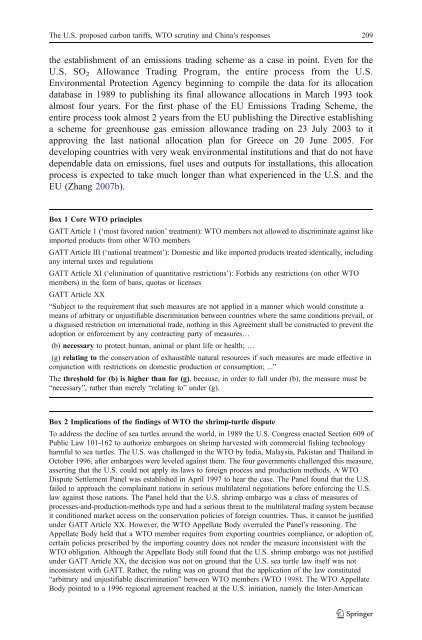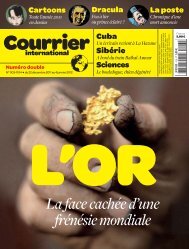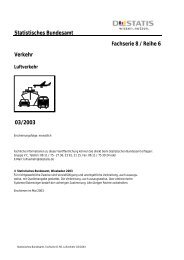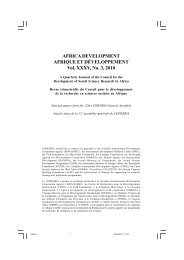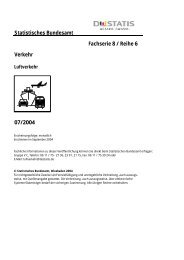The international economics of resources and resource ... - Index of
The international economics of resources and resource ... - Index of
The international economics of resources and resource ... - Index of
You also want an ePaper? Increase the reach of your titles
YUMPU automatically turns print PDFs into web optimized ePapers that Google loves.
<strong>The</strong> U.S. proposed carbon tariffs, WTO scrutiny <strong>and</strong> China’s responses 209<br />
the establishment <strong>of</strong> an emissions trading scheme as a case in point. Even for the<br />
U.S. SO2 Allowance Trading Program, the entire process from the U.S.<br />
Environmental Protection Agency beginning to compile the data for its allocation<br />
database in 1989 to publishing its final allowance allocations in March 1993 took<br />
almost four years. For the first phase <strong>of</strong> the EU Emissions Trading Scheme, the<br />
entire process took almost 2 years from the EU publishing the Directive establishing<br />
a scheme for greenhouse gas emission allowance trading on 23 July 2003 to it<br />
approving the last national allocation plan for Greece on 20 June 2005. For<br />
developing countries with very weak environmental institutions <strong>and</strong> that do not have<br />
dependable data on emissions, fuel uses <strong>and</strong> outputs for installations, this allocation<br />
process is expected to take much longer than what experienced in the U.S. <strong>and</strong> the<br />
EU (Zhang 2007b).<br />
Box 1 Core WTO principles<br />
GATT Article 1 (‘most favored nation’ treatment): WTO members not allowed to discriminate against like<br />
imported products from other WTO members<br />
GATT Article III (‘national treatment’): Domestic <strong>and</strong> like imported products treated identically, including<br />
any internal taxes <strong>and</strong> regulations<br />
GATT Article XI (‘elimination <strong>of</strong> quantitative restrictions’): Forbids any restrictions (on other WTO<br />
members) in the form <strong>of</strong> bans, quotas or licenses<br />
GATT Article XX<br />
“Subject to the requirement that such measures are not applied in a manner which would constitute a<br />
means <strong>of</strong> arbitrary or unjustifiable discrimination between countries where the same conditions prevail, or<br />
a disguised restriction on <strong>international</strong> trade, nothing in this Agreement shall be constructed to prevent the<br />
adoption or enforcement by any contracting party <strong>of</strong> measures…<br />
(b) necessary to protect human, animal or plant life or health; …<br />
(g) relating to the conservation <strong>of</strong> exhaustible natural <strong><strong>resource</strong>s</strong> if such measures are made effective in<br />
conjunction with restrictions on domestic production or consumption; ...”<br />
<strong>The</strong> threshold for (b) is higher than for (g), because, in order to fall under (b), the measure must be<br />
“necessary”, rather than merely “relating to” under (g).<br />
Box 2 Implications <strong>of</strong> the findings <strong>of</strong> WTO the shrimp-turtle dispute<br />
To address the decline <strong>of</strong> sea turtles around the world, in 1989 the U.S. Congress enacted Section 609 <strong>of</strong><br />
Public Law 101-162 to authorize embargoes on shrimp harvested with commercial fishing technology<br />
harmful to sea turtles. <strong>The</strong> U.S. was challenged in the WTO by India, Malaysia, Pakistan <strong>and</strong> Thail<strong>and</strong> in<br />
October 1996, after embargoes were leveled against them. <strong>The</strong> four governments challenged this measure,<br />
asserting that the U.S. could not apply its laws to foreign process <strong>and</strong> production methods. A WTO<br />
Dispute Settlement Panel was established in April 1997 to hear the case. <strong>The</strong> Panel found that the U.S.<br />
failed to approach the complainant nations in serious multilateral negotiations before enforcing the U.S.<br />
law against those nations. <strong>The</strong> Panel held that the U.S. shrimp embargo was a class <strong>of</strong> measures <strong>of</strong><br />
processes-<strong>and</strong>-production-methods type <strong>and</strong> had a serious threat to the multilateral trading system because<br />
it conditioned market access on the conservation policies <strong>of</strong> foreign countries. Thus, it cannot be justified<br />
under GATT Article XX. However, the WTO Appellate Body overruled the Panel’s reasoning. <strong>The</strong><br />
Appellate Body held that a WTO member requires from exporting countries compliance, or adoption <strong>of</strong>,<br />
certain policies prescribed by the importing country does not render the measure inconsistent with the<br />
WTO obligation. Although the Appellate Body still found that the U.S. shrimp embargo was not justified<br />
under GATT Article XX, the decision was not on ground that the U.S. sea turtle law itself was not<br />
inconsistent with GATT. Rather, the ruling was on ground that the application <strong>of</strong> the law constituted<br />
“arbitrary <strong>and</strong> unjustifiable discrimination” between WTO members (WTO 1998). <strong>The</strong> WTO Appellate<br />
Body pointed to a 1996 regional agreement reached at the U.S. initiation, namely the Inter-American


